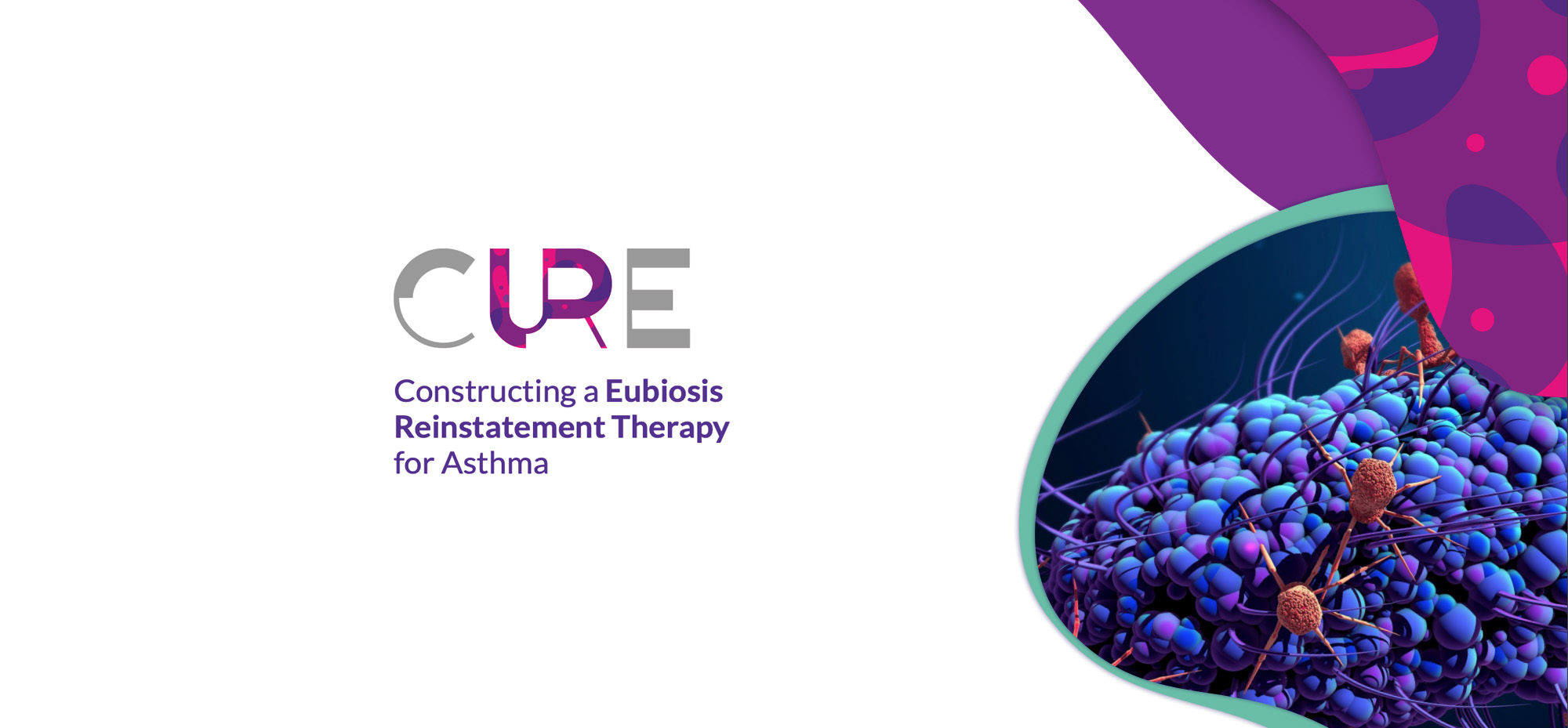This week, we’re spotlighting CURE, a European Horizon 2020-funded, multidisciplinary project aiming to lay the foundation for treating and curing asthma by first understanding the microbiome and immunology associated with the disease, then strategically applying phages.
The main sources for this article are the two newsletter updates published by CURE: the first in Winter 2019 and the most recent in Spring 2020.
What do we know about asthma?
30 million people in Europe suffer from asthma, but it isn’t well-controlled, and there is no cure. Among what’s known is that asthma is associated with improper immune responses, and that exacerbations tend to correlate with viral infection (e.g. rhinoviruses). Not much is known about the role of the microbiome in asthma, but it’s possible that microbes have an impact on asthma through their impact on the immune response.
Enter the CURE project
The CURE (Constructing a Eubiosis Reinstatement Therapy for Asthma) project is a multi-center initiative aiming to use phage therapy to rebalance the structure of the airway microbiome, to hopefully control the immune dysregulation of asthma and eventually cure it. It is made up of research institutions in Greece, Poland, Switzerland, Sweden, UK, and Georgia, as well as allergy and airway disease-related patient associations in Europe. The CURE project, which began in 2017, was funded by Horizon 2020, a European Union initiative that emphasizes excellent science, industrial leadership and tackling societal challenges.
Why phages?
The idea of looking into phages in the context of asthma came from the observation that people with asthma had fewer phages in their respiratory tract than healthy people. Could the phages in healthy people be keeping certain bacteria in check, or could the absence of phages point to an absence of certain bacteria needed to maintain health? This was what prompted the CURE team to get together to start their project.
Mapping out the airway microbiome, predicting phage effects, and designing interventions
One of the CURE project’s first steps was to study and compare asthmatic vs. healthy respiratory microbiomes (including the viromes and viral-bacterial interaction networks), alongside clinical phenotypes. Next, they would set out to model the microbial ecosystem in the airways and the potential impacts phages might have on both the microbiome and the host immune system.
Based on the learnings from these first steps, they aimed to build up a well-characterized phage library against strains likely to be relevant to asthma treatment (this part would be done by the Eliava Institute in Georgia). They’d also look at the impact of phages on immune cells and respiratory tissues. Ultimately they aimed to develop phage cocktails to selectively alter the respiratory microbiome of asthmatic patients in a way they hope will treat or even cure the patients’ asthma.
CURE progress to date
The CURE project has reached its halfway point, as described in their Spring 2020 newsletter. So far, they’ve followed 60 asthmatic patients and 30 healthy individuals for a year, analyzing the airway microbiomes and correlating these with symptoms and immune responses.
Multiple asthma-specific microbiomes
So far, they’ve essentially seen a personalized microbiome for each patient, with a core set of microbial families that is fairly stable over time. And yet, with asthmatic patients, they saw more “dispersed” microbiomes compared with healthy individuals, suggesting the existence of multiple disease states vs. a relatively stable healthy state. They also saw that they could use “steady state” microbiome characteristics to cluster asthmatic patients according to those who had an exacerbation during the study.
Phages don’t harm airway tissue, but do alter immune cell numbers and activation states
The CURE group has also looked into the effects of phages on airway epithelial cells and immunity, and found so far that (at least Staphylococcus phages) don’t affect tissue integrity or tight junctions. However, they did see phage-induced effects on innate immune cell numbers and activation states, suggesting phages may play a role in immune tolerance and inflammation.
The beginning of an asthma-relevant phage collection
The CURE group has started collecting phages (against upper respiratory bacteria considered important in asthma, like Moraxella, Acinetobacter, Streptococcus, Haemophilus and Staphylococcus). So far, they’ve discovered and characterized at least 30 new phages. They’ve also reported developing an algorithm to describe the phage-bacteria network in the airway, which has allowed them to start predicting phage host ranges.
Next steps: modeling phage impacts on asthma
The CURE project’s next steps will involve developing computational models of how the asthmatic airway microbiome changes over time, and modeling and predicting the impact of phage interventions.
Regulatory hurdles
One main hurdle described by the CURE team pertains to European regulation surrounding phage therapy. Put simply, in most European countries, regulatory hurdles stand in the way of using phages outside of compassionate use (last-resort) treatments. This will clearly pose a problem long-term, since the CURE project’s vision is to eventually treat patients with asthma, who would depend on phages being authorized for use beyond last-resort treatments.
As an encouraging exception, the group describes the promise of Belgium’s Magistral Phage pathway for pharmacist-administered phages. To further explain, they feature an interview with Dr. Jean-Paul Pirnay of the Queen Astrid Military Hospital, who played a key role in bringing about the magistral phage framework in Belgium, and who is a member of CURE’s Ethics Advisory Board.
Summary
We chose to highlight the CURE project because it is an exciting, collaborative, multidisciplinary initiative that stands to introduce phages into an important medical context that isn’t commonly discussed as a possible target for phages: asthma. It will be exciting to watch how the project moves ahead, and to see whether it generates data that points to phages being potentially useful in treating asthma. And by making a positive impression at the level of the European Union, as it stands to do, perhaps the CURE project may help accelerate phage-friendly regulatory shifts in Europe.
Learn more
- Check out the CURE project website
- For more on the progress the CURE team has made to date, read their newsletters (the first, from Winter 2019, which sets the stage for the project, and the most recent, from Spring 2020, which provides the halfway mark update)
- Watch the video interview with Nikolaos Papadopoulos, the coordinator of the CURE project, who describes the initiative’s goals.
- Watch the video interview with Jean-Paul Pirnay of the Queen Astrid Military Hospital in Brussels, Belgium
- Want to apply for Horizon 2020 for your phage project, now that you know they’re amenable to funding phage work? Check out the Horizon 2020 website
May 29, 2020
Update: since this post was written, we learned the following from Sofia Romagosa at the European Federation of Allergy and Airways Diseases Patients’ Associations (EFA):
- The partner from Sweden is no longer part of the CURE team







